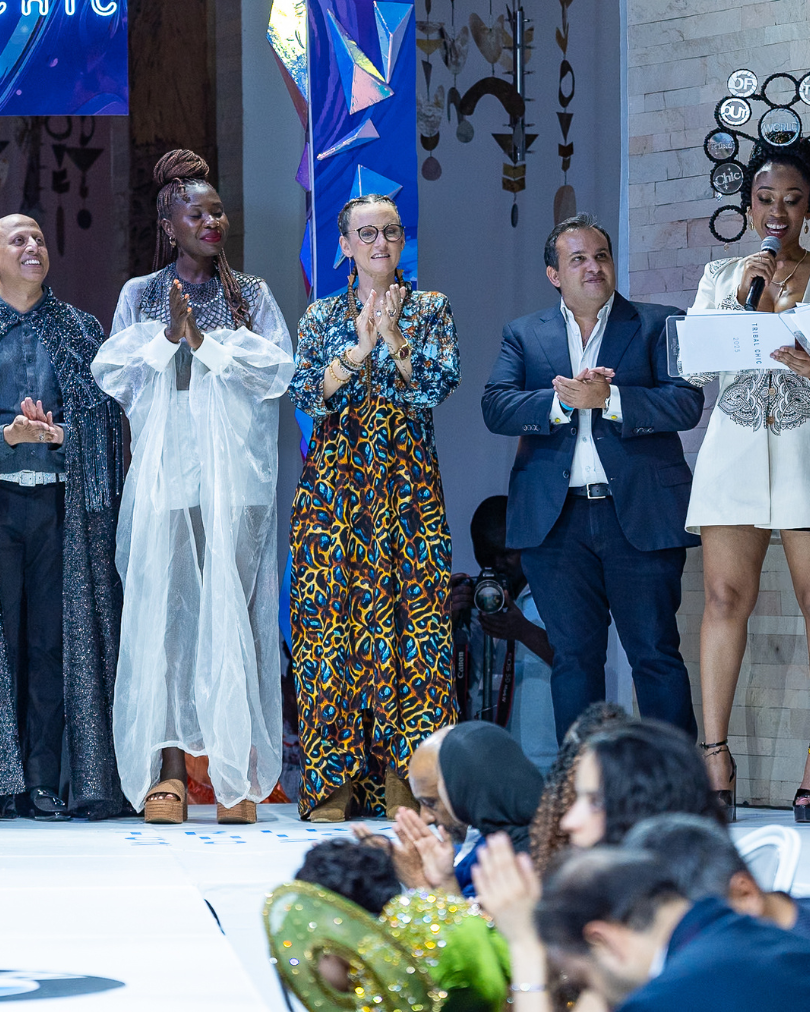In the crowded alleys of Kibera, Nairobi’s largest informal settlement, a revolution in fashion quietly took shape. Amid the hum of sewing machines and the snip of scissors cutting through upcycled denim, artisans fashioned pieces that would ultimately grace the runway at Africa Fashion Week London (AFWL) 2025.
For AfroWema, that leap from corrugated roofs to a global stage was never just about clothing it was a bold statement of identity, sustainability, and possibility.
Stitching Dreams in the Heart of Kibera
Inside a modest workshop in Nairobi, young tailors worked late into the night, weaving stories into each garment. One wall bore the simple message: “Every stitch is a story.” One of those dresses born from upcycled denim, slow craftsmanship, and social purpose would soon shimmer under London lights.
This wasn’t just a showcase for design; it was a narrative of transformation, resilience, and cultural pride. AfroWema’s founder, Tatiana Teixeira, said it best after the show:
“We took sustainable African fashion straight into the heart of London … more than fashion. It was culture, impact, and global recognition.”
The “Savage Beauty” Debut
Savage Beauty, AfroWema’s debut collection, was a symphony of sculpted denim gowns, flowing cotton, and vibrant prints that married heritage with modernity. The silhouettes drew from Nairobi’s streets and African architectural lines, daring to redefine luxury by placing sustainability at the core.
This collection wasn’t a whisper; it was a beautiful rebellion one that challenged fashion norms and elevated materials often discarded by the industry.
Behind the Fabrics: Collaboration & Purpose
Every piece in the show carried more than aesthetic weight. They were built on collaboration across continents:
-
Upcycled denim sourced through Green Africa
-
Cotton textiles woven ethically by Kenyan cooperatives
-
Kitenge fabrics imported from Ghana and Nigeria
-
Crafted by tailors and artisans in Kibera who are often invisible in fashion’s global narrative
There’s a story behind each seam. One tailor, Brian Omondi, proudly revealed he stitched a sleeve on a now-famous gown. “When I saw it on stage, I felt like I was there too,” he shared.
Why This Moment Matters
The London audience’s applause was more than validation it was affirmation that fashion born in overlooked places can resonate worldwide. AfroWema’s entrance to AFWL repositions the narrative: luxury is not about excess; it’s about intention, integrity, and identity.
This moment becomes a milestone for Kibera, for African artisans, and for sustainable fashion. It shatters assumptions and demands that creativity, culture, and sustainability walk hand in hand.
What’s Next for AfroWema?
AfroWema is no longer a local brand; it’s a global voice. After London, its foundation in ethical design, artisan collaboration, and sustainable practices is now more visible and viable to the world.
As the brand grows, the challenge remains: scale without compromise, reach without relinquishing values. But if their London debut is a guide, AfroWema is poised not just to dress the world but to change how it imagines fashion.
“Savage Beauty is more than a fashion statement it’s a movement proving that sustainability and luxury can, and must, go hand in hand.”
Source :TXT AFrica

